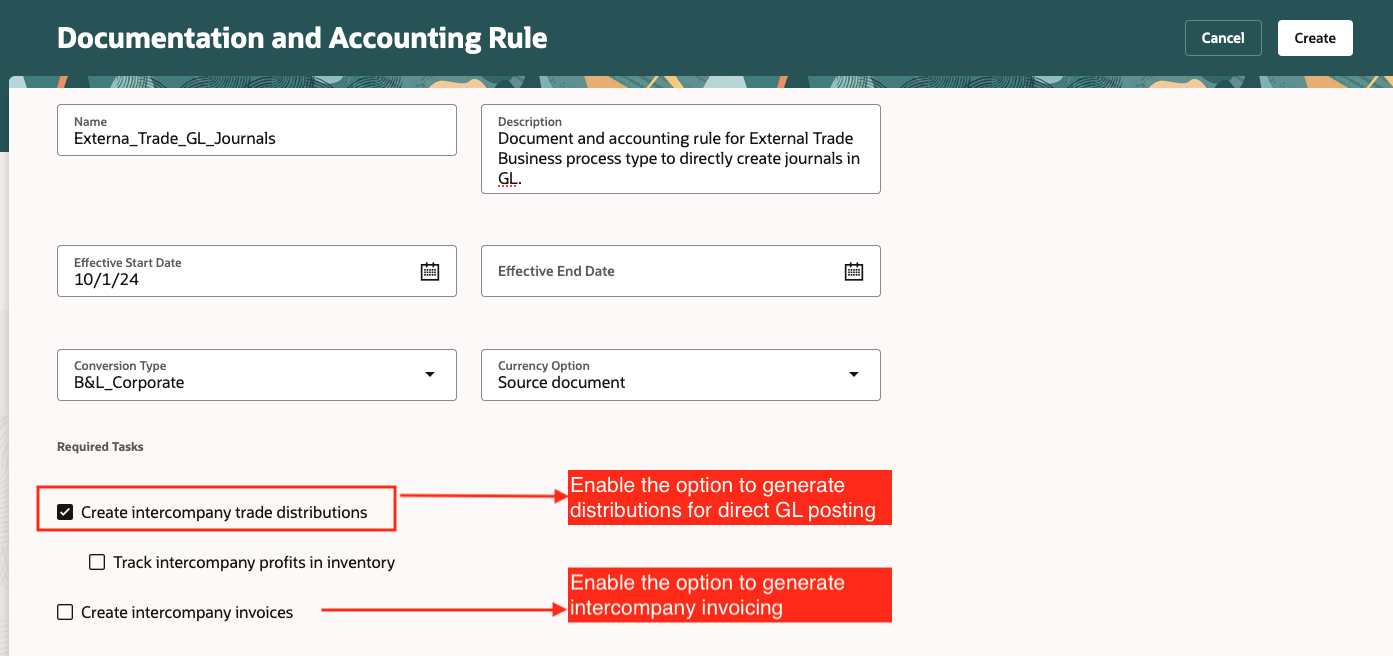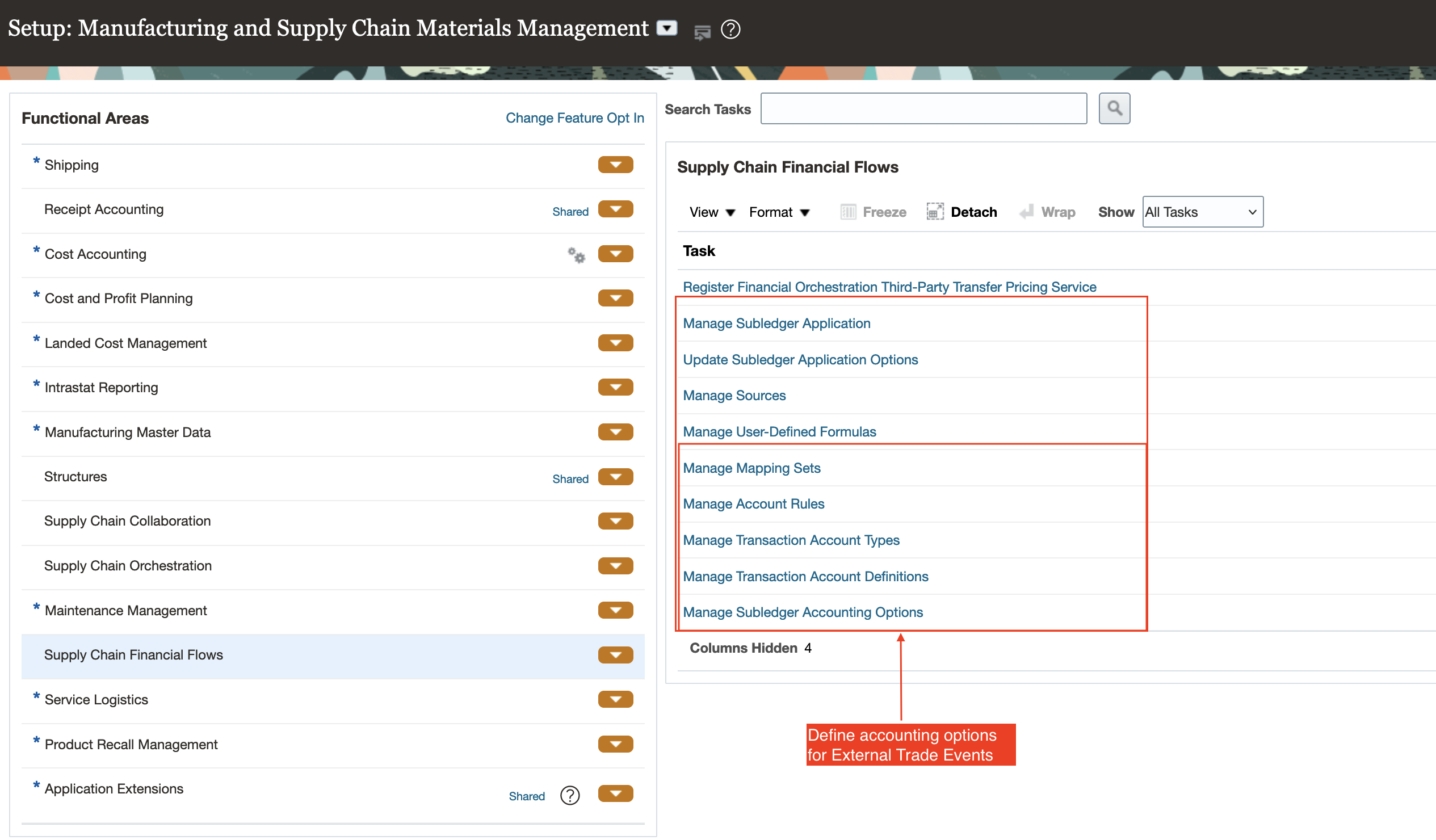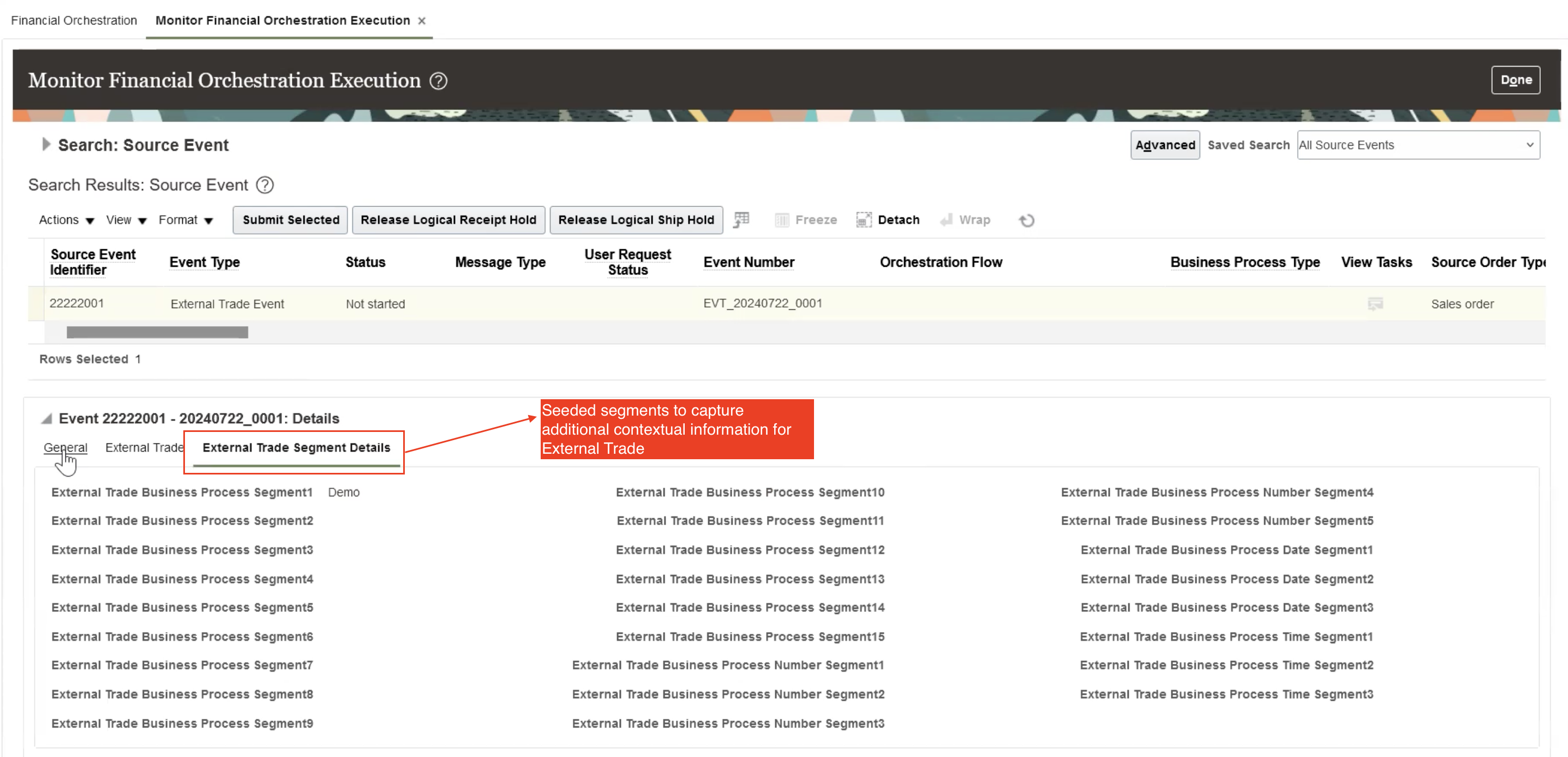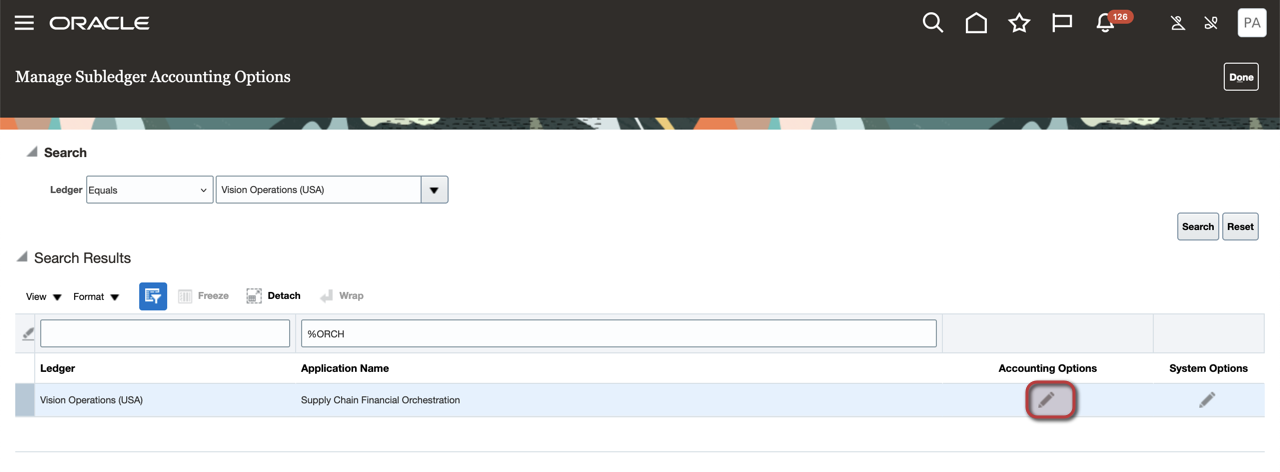Create Journals for Intercompany Transactions Uploaded from Oracle Subscriptions or External Sources Without Using Intercompany Invoicing
You can now directly generate journals in the General Ledger Application (GL) for events using a configurable option in document and accounting rules.

Screenshot of Document and Accounting Rules Showing Configurable Option
Based on the configuration defined in the document and accounting rule used in the external trade financial orchestration flow agreement, the external trade events imported will be orchestrated to either generate journals directly in GL or generate intercompany receivables and payables invoices using the transfer pricing rules.
A new journal entry category, Intercompany Trade, is introduced for grouping and posting the distributions for external trade events directly to GL with source as SCM Intercompany from the subledger Supply Chain Financial Orchestration.
Before you import the transactions for financial orchestrating, you need to complete these setup tasks in the application:
- Define the Provider and Receiver Business Units for which the transactions are getting imported as Profit Center BU.
- Complete the regular setup tasks for Financial Orchestration between the Profit Center BUs
- Manage Intercompany Customer Supplier Association
- Manage Profit Center Business Unit Party Relationship
- Intercompany Buyer Profile
- Intercompany Seller Profile
- Manage Supply Chain Financial Orchestration Documentation and Accounting Rules
- Manage Supply Chain Financial Orchestration Transfer Pricing Rules
- Manage Supply Chain Financial Orchestration Flows
- Manage Transaction Account Definitions (TAD)
Use the Transaction Accounting Definition setup under the Supply Chain Financial Flows page to configure the right account for these transactions while creating intercompany receivables and payables.

Screenshot of Transaction Account Definition Task in Supply Chain Financial Flows
Use the seeded mapping set to define the account to be passed as charge account or liability account for intercompany receivables and payables accounting.

Screenshot of the Mapping Set Used to Derive the Relevant Account for Posting the Transactions into GL
The following sources are seeded in the mapping set to use:
- Provider BU
- Receiver BU
- Financial Orchestration Category (Item category used for Supply Chain Financial Orchestration)
You can use the available additional accounting sources to configure a user-defined account.
While importing the transactional data, you can bring in additional contextual information using the seeded segments available at transaction header and transaction line levels in the REST service payload. You can use these attributes as qualifier for identifying the right financial orchestration flow agreement for an external trade transaction. Of these, segment 1 to segment 15 can also be used as additional accounting sources.

Screenshot of the Monitor Financial Orchestration Execution for External Trade Event
This feature helps you define accurate transfer pricing rules for your intercompany transactions that are coming from external sources and configure the accounting for these transactions in Oracle Fusion Cloud SCM.
Steps to Enable
Enable the ORA_FOS_EXTERNAL_TRADE_EVENTS profile option using the following steps:
- In the Setup and Maintenance work area, go to the following:
- Offering: Manufacturing and Supply Chain Management
- Functional Area: Supply Chain Financial Flows
- Task: Manage Administrator Profile Values
- On the Manage Administrator Profile Values page, enable the new ORA_FOS_EXTERNAL_TRADE_EVENTS profile option at Site, Product, or User level.
- At Site level, select Yes for the External Trade Business Process Type Enabled option.
Tips And Considerations
- Transfer pricing option with source document price are only supported for external trade events business flow.
- UOM imported for external trade events represents transactional UOM.
- The amount computed in the transfer price currency is set as the entered amount to GL.
- The Track Internal Company Profits in Inventory option on document and accounting rule isn’t applicable for external trade financial orchestration flow.
- To process return transactions, import the same unreferenced returns for external trade as that of a regular transaction.
- In order to modify the mapping sets to account rules, it’s recommended to copy the seeded TAD definition and then configure it as per business needs. You also need to assign the TAD to the ledger using the Manage Subledger Accounting options setup.

Screenshot of the Accounting Options Page

Screenshot of Edit Accounting Options Page
Key Resources
- Refer to the Oracle Fusion Cloud SCM: Implementing Manufacturing and Supply Chain Materials Management guide, available on the Oracle Help Center.
Access Requirements
Users who are assigned a configured job role that contains these privileges can access this feature:
- Manage Documentation and Accounting Rules (FOS_MANAGE_TRADE_AND_ACCOUNTING_RULES)
- Maintain Supply Chain Financial Orchestration Flow(FOS_MAINTAIN_SUPPLY_CHAIN_FINANCIAL_TRADE_AGREEMENT)
- Manage Supply Chain Financial Orchestration Flow (FOS_MANAGE_SUPPLY_CHAIN_FINANCIAL_TRADE_AGREEMENT)
- Manage Supply Chain Financial Orchestration Qualifiers (FOS_MANAGE_TRADE_QUALIFIERS)
- Manage Supply Chain Financial Orchestration System Options (FOS_MANAGE_SUPPLY_CHAIN_FINANCIAL_ORCHESTRATION_SYSTEM_OPTIONS)
- Manage Transfer Pricing Rules (FOS_MANAGE_TRANSFER_PRICING_RULES)
- Manage External Trade Events by Web Service (FOS_IMPORT_EXTERNAL_TRADE_EVENTS_WEB_SERVICE)
- Transfer Financial Orchestration Task Layer Status (FOS_TASK_LAYER_CALL_BACK)
- Manage Profit Center Business Unit to Party Relationship (FOS_MANAGE_PROFIT_CENTER_BUSINESS_UNIT_PARTY_RELATIONSHIP)
- Run Supply Chain Financial Orchestration Flow Definitions Upgrade (FOS_FINANCIAL_ORCHESTRATION_FLOW_DEFINITIONS_UPGRADE)